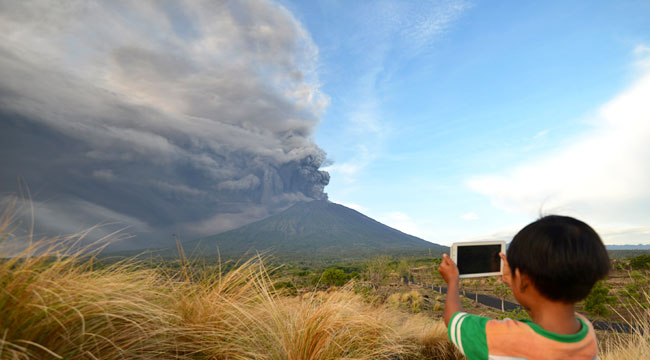
Over the weekend, Bali’s highest volcano, Mount Agung, began spewing thick clouds of ash over the Indonesian resort island. Multiple eruptions sent ash flying miles into the sky, which grounded flights and signaled evacuations for 24,000 people. On Monday, officials increased the number of affected residents and tourists while strongly urging 100,000 people to evacuate the “danger zone” of six miles surrounding the volcano. The New York Times reports that a major eruption, if it happens, could quickly blanket those six miles in a five-feet deep pyroclastic flow of lava, ash, and other hot gases.
Additional apprehension on behalf of Indonesia’s Center for Volcanology and Geological Hazard Mitigation sources from the lack of data surrounding the last major eruption of Mount Agung, which killed 1,100 people in 1963. As a result, Sky News reports that authorities have now issued the highest alert level (one level higher than anticipated on Sunday) while warning that a major eruption could be “imminent.” Unfortunately, many Bali residents in the danger zone have not yet heeded the evacuation call:
Spokesman Sutopo Purwo Nugroho told a news conference in Jakarta that the extension of the danger zone affects 22 villages and about 90,000 to 100,000 people. He said about 40,000 people have evacuated but others have not left because they feel safe or don’t want to abandon their livestock.
“Authorities will comb the area to persuade them,” he said. “If needed we will forcibly evacuate them.”
Also of concern, other than residents who fear leaving their land, are thousands of tourists who wish to depart Bali but find themselves trapped. Authorities hope to resume some flights and transport people far away from Mount Agung, but if a major eruption happens before Tuesday (which is when officials hoped to reopen the airport), it would be too late for people to leave the island until after the ash cloud disperses. And officials fear that the results could be lethal.
(Via New York Times, The Independent, Sky News & CNN)
